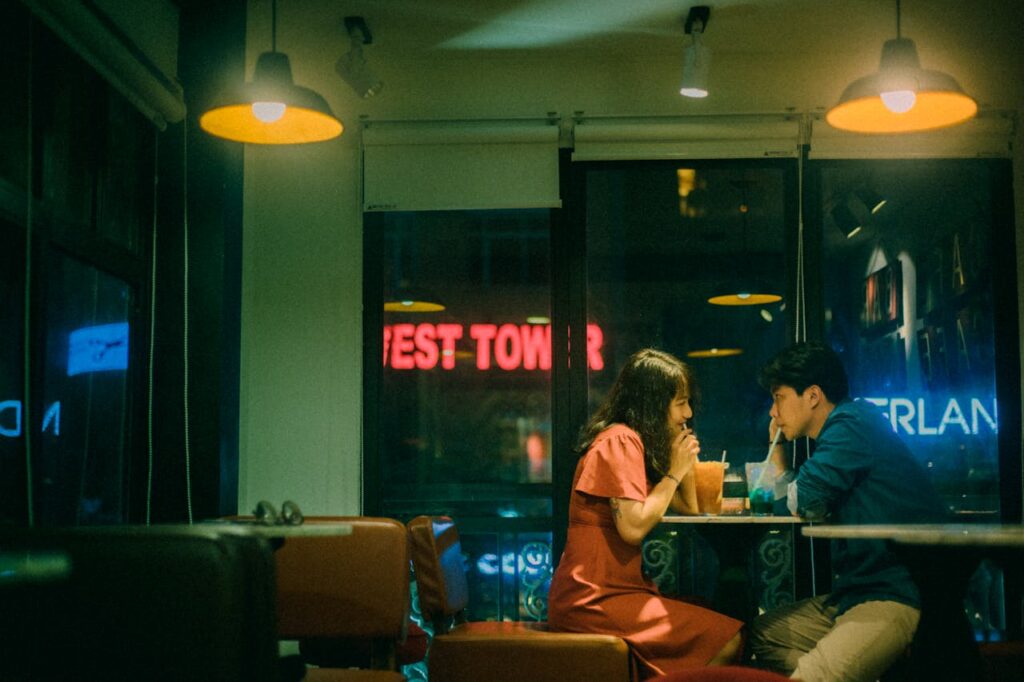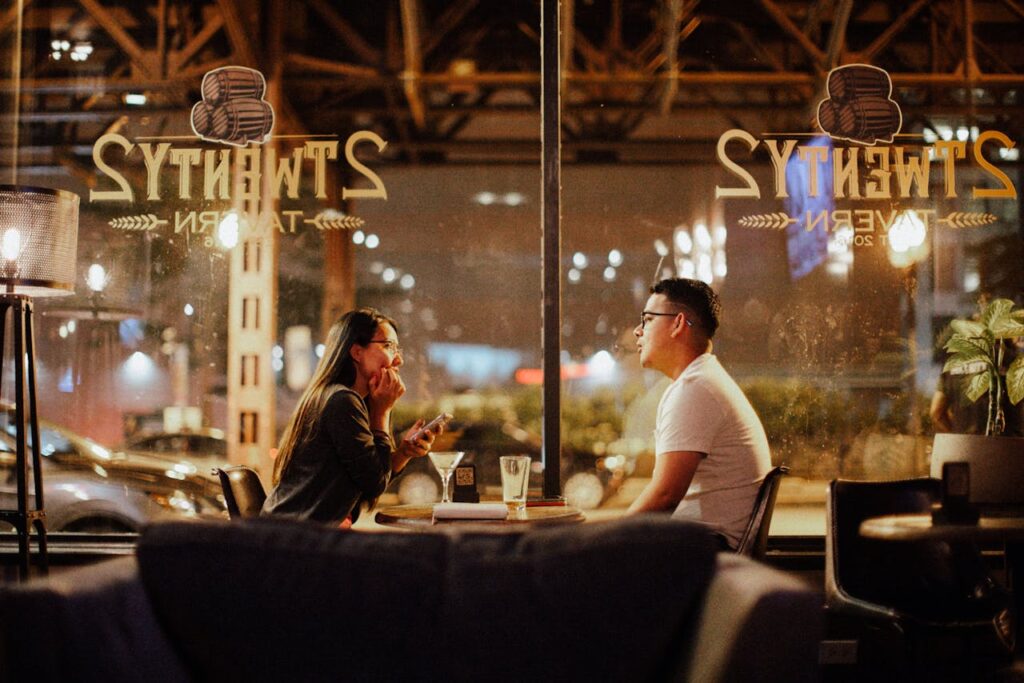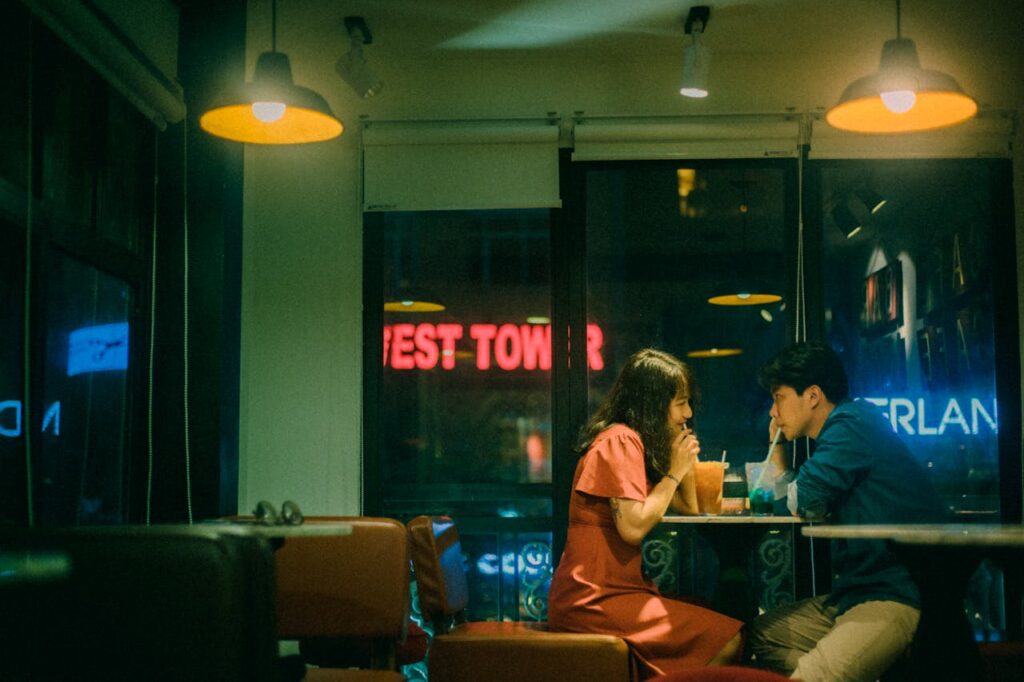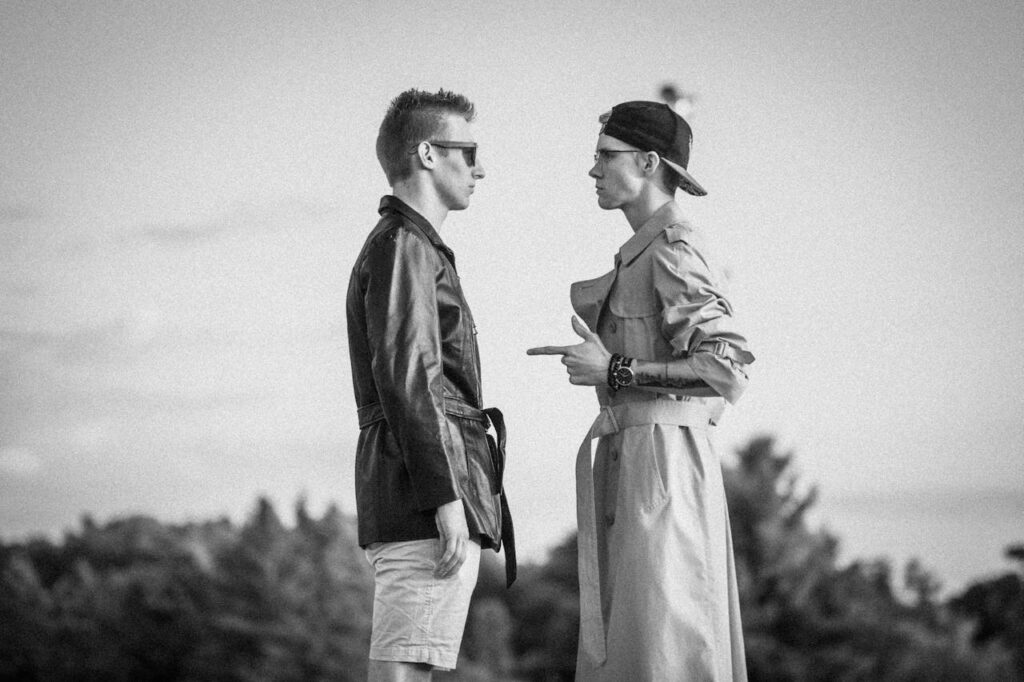Dating language has evolved dramatically in recent years, with new terms emerging from dating apps, social media, reality TV, changing relationship expectations, and pages like this, seeking a little content and a few clicks. For British daters navigating the complex world of modern romance, understanding this linguistic landscape is essential, if only to studiously avoid some of the phrases like the plague.
Love Island To Algorithms: How We Got Here
Modern dating terminology in Britain reflects a blend of influences that have transformed how we talk about relationships. Dating app features, reality TV shows (particularly Love Island UK), and changing relationship expectations have all contributed to this evolving vocabulary.
Perhaps most interestingly, 95% of singles now report that concerns about the future impact how and who they date, leading to more intentional approaches and new terms to describe these shifts.
Where older generations might have simply been ‘going steady’ or ‘seeing someone’, today’s daters navigate a complex web of situationships, nano-ships, and kiss-mets. This terminology isn’t just trendy jargon – it provides a shared vocabulary for the uniquely modern experiences of dating in a digital world, especially as British daters balance traditional sensibilities with contemporary relationship structures.


Digital Dating: When Apps Create Language
Dating apps have revolutionised not just how we meet potential partners, but how we talk about the process of meeting potential partners. Many terms have emerged directly from app features or user behaviors:
App-Specific Vocabulary
- Roses (Hinge): Premium tokens given to someone you’re especially interested in, with users receiving one free rose weekly.
- Beeline (Bumble): Section showing users who have already liked your profile.
- Thursday Events: Popular in London, these are in-person gatherings for singles held exclusively on Thursdays by Thursday, who claim to be ‘the biggest IRL dating app in the world’.
- Vision Board (Tinder): A feature introduced by Tinder where users create personalised mood boards to visualise their dating goals, with 20% of singles reporting they’ve created such boards.
User Behaviours Born From Algorithms
- Date Stacking: Scheduling multiple dates in a single day or weekend, a trend particularly common in London where busy professionals maximise dating efficiency.
- Dawn Dating: Morning dates before 10am (like coffee or runs), coined by UK-based Badoo in 2023.
- Loud Looking: Being explicitly clear about what you’re seeking in a dating profile rather than using vague descriptions, reflecting a trend toward greater transparency.
- Digital Body Language (DBL): How users communicate interest through subtle cues in messaging and app behaviour rather than physical signals, identified as particularly important to Gen Z daters.

Modern Relationship Types: Beyond “It’s Complicated”
Traditional relationship labels are being supplemented or replaced by a range of terms describing more nuanced connections:
- Nano-ships: Small, meaningful micro-connections that might not develop into traditional relationships but are valued for what they are. Includes subcategories like ‘eyecontactship’ (connection through eye contact with a stranger) and “textuationship” (regular text exchanges creating connection without deeper commitment).
- Kiss-mets: Spontaneous, unscripted dating moments that feel authentic rather than perfectly curated, representing a shift away from rigid dating rules. The name blends ‘kismet’ (destiny) with the romantic implication of a kiss.
- Micro-mance: Small, thoughtful romantic gestures that have replaced grand displays of affection. 89% of singles surveyed by Bumble agree these small gestures (sending memes, sharing playlists, morning coffee walks) are the new way to show care.
- Delusionship: A one-sided fantasy relationship with someone you don’t have an established connection with, like a cashier you see regularly or someone you matched with but haven’t met.
- No-habiting: Choosing not to live with your partner to maintain personal space, a trend gaining popularity in Britain where housing costs make traditional relationship progression challenging.


Dating Behaviours: The Good, The Bad, The Cringeworthy
The vocabulary for describing modern dating behaviors continues to expand, with new terms for both positive and problematic patterns:
The Positive
- Freak Matching: Connecting over shared quirks or unique interests – finding someone who matches your specific brand of weird.
- Future-Proofing: As True Dating tell us, it’s all about having upfront conversations about traditionally taboo topics (finances, housing, climate change) early in dating to ensure long-term compatibility, reflecting economic concerns among British daters.
- StICKing: Looking past initial ‘icks’ (minor turn-offs) to pursue someone compatible despite superficial oddities. Shows greater emotional maturity, perhaps.
- Dry Dating: Dating without alcohol, a trend gaining traction in Britain where pub culture has traditionally dominated dating scenes.
The Problematic
- Breadcrumbing: Leading someone on with intermittent messages just frequent enough to maintain interest without real dating intentions.
- Yap-Trapping: Dominating conversation by only talking about yourself without reciprocal interest.
- Trudging: A dating app term describing dating that feels like ‘walking through mud with heavy rain boots’ – a particularly British metaphor for difficult dating.
- Waltzing: A term for relationships that repeatedly speed up and slow down, named after the dance’s rhythmic pattern.

Distinctly British: Home-Grown Dating Lingo
The cultural phenomenon/curse of Love Island has significantly expanded British dating lexicon, introducing terms like ‘grafting’ (working hard to impress someone), ‘the ick’ (sudden disgust toward someone previously attractive), ‘laying it on factor 50’ (coming on too strong), ‘muggy/mugged off’ (being disrespected), ‘on job’ (actively seeking partners), and ‘moving loose’ (flirting with multiple people).
Regional variations add another layer of complexity to British dating lingo. Scottish daters might ‘winch’ (kiss or make out) before settling in for a ‘coorie’ (cuddle, especially when cold). In Wales, romantic partners share a ‘cwtch’ (cuddle with romantic connotations) and call each other ‘cariad’ (‘love’ or ‘darling’).
Irish terminology includes ‘shift’ (kissing with tongues) and ‘ride’ (an attractive person). These regional expressions reflect the diverse cultural influences across the United Kingdom and demonstrate how dating language evolves distinctly even within a relatively small geographical area.


Looking Ahead: 2025’s Hottest Dating Terms
Dating terminology continues to evolve, with several terms predicted to define the 2025 dating landscape:
Partner Types Getting Specific
- Hot Rodent: Term for an unconventionally attractive boyfriend, with Matt Healy, Timothée Chalamet and Jeremy Allen White all cited as examples.
- Black Cat: Describes an introverted, mysterious girlfriend
- Golden Retriever: A partner who’s enthusiastic, loyal and optimistic, like the dog breed.
- Cinnamon Roll: A sweet, kind partner who brings warmth to a relationship.
New Value-Based Connections
- Fiscal Attraction: Seeking a match who is both financially secure and physically attractive, reflecting economic concerns particularly relevant in Britain’s uncertain financial climate.
- On The Same (Fan) Page: Finding connection through shared fandoms, with Gen Z singles believing that ‘geeking out’ together is a form of intimacy.
- Swamping: Finding someone comfortable enough to share your authentic, unfiltered self with, without pressure to maintain a perfect image.
- Facing Your F-eras: Inspired by Taylor Swift, casting away past relationship disappointments to embrace future dating opportunities.


What Modern Dating Terminology Reveals About Relationships Today
The evolution of dating language reflects fundamental shifts in how we approach relationships. Where previous generations followed relatively structured courtship patterns, today’s daters navigate a complex landscape with more options, fewer rules, and greater emphasis on individual preferences and boundaries.
British dating terminology in particular reveals tensions between traditional relationship expectations and modern realities, with terms like ‘no-habiting’ and ‘future-proofing’ highlighting how economic pressures shape romantic choices. Meanwhile, the influence of reality TV and social media has created a more performative element to dating, reflected in terms like ‘hard launching’ relationships.
As we move into 2025, the trend toward authenticity and intentionality seems set to continue, with terms like ‘loud looking’ and ‘swamping’ suggesting a move away from game-playing toward more honest connection.
For British daters navigating this evolving landscape, staying fluent in the latest terminology isn’t just about keeping up with trends—it’s about understanding the cultural shifts reshaping how we find and maintain romantic connections.





